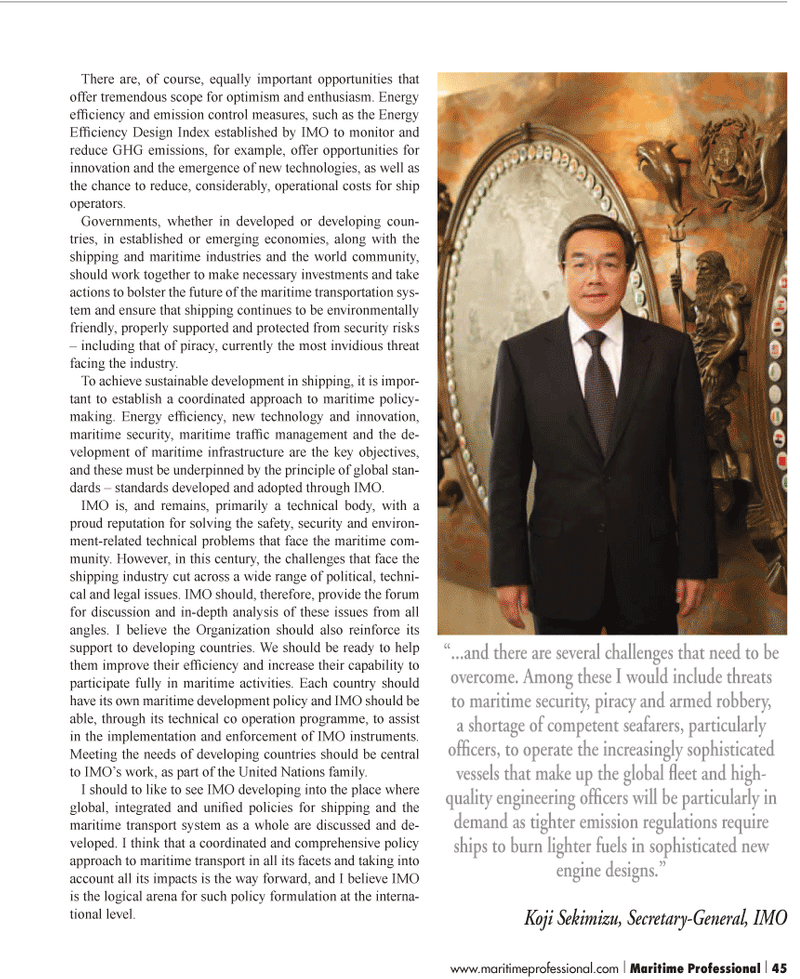
Page 45: of Maritime Logistics Professional Magazine (Q1 2012)
Training & Maritime Security
Read this page in Pdf, Flash or Html5 edition of Q1 2012 Maritime Logistics Professional Magazine
...and there are several challenges that need to be overcome. Among these I would include threats to maritime security, piracy and armed robbery, a shortage of competent seafarers, particularly of? cers, to operate the increasingly sophisticated vessels that make up the global ? eet and high- quality engineering of? cers will be particularly in demand as tighter emission regulations require ships to burn lighter fuels in sophisticated new engine designs.? Koji Sekimizu, Secretary-General, IMO There are, of course, equally important opportunities that offer tremendous scope for optimism and enthusiasm. Energy efÞ ciency and emission control measures, such as the Energy EfÞ ciency Design Index established by IMO to monitor and reduce GHG emissions, for example, offer opportunities for innovation and the emergence of new technologies, as well as the chance to reduce, considerably, operational costs for ship operators.Governments, whether in developed or developing coun- tries, in established or emerging economies, along with the shipping and maritime industries and the world community, should work together to make necessary investments and take actions to bolster the future of the maritime transportation sys- tem and ensure that shipping continues to be environmentally friendly, properly supported and protected from security risks ? including that of piracy, currently the most invidious threat facing the industry. To achieve sustainable development in shipping, it is impor- tant to establish a coordinated approach to maritime policy- making. Energy ef Þ ciency, new technology and innovation, maritime security, maritime traf Þ c management and the de- velopment of maritime infrastructure are the key objectives, and these must be underpinned by the principle of global stan- dards ? standards developed and adopted through IMO. IMO is, and remains, primarily a technical body, with a proud reputation for solving the safety, security and environ- ment-related technical problems that face the maritime com- munity. However, in this century, the challenges that face the shipping industry cut across a wide range of political, techni- cal and legal issues. IMO should, therefore, provide the forum for discussion and in-depth analysis of these issues from all angles. I believe the Organization should also reinforce its support to developing countries. We should be ready to help them improve their ef Þ ciency and increase their capability to participate fully in maritime activities. Each country should have its own maritime development policy and IMO should be able, through its technical co operation programme, to assist in the implementation and enforcement of IMO instruments. Meeting the needs of developing countries should be central to IMO?s work, as part of the United Nations family. I should to like to see IMO developing into the place where global, integrated and uni Þ ed policies for shipping and the maritime transport system as a whole are discussed and de- veloped. I think that a coordinated and comprehensive policy approach to maritime transport in all its facets and taking into account all its impacts is the way forward, and I believe IMO is the logical arena for such policy formulation at the interna- tional level. www.maritimeprofessional.com | Maritime Professional | 45

 44
44

 46
46
